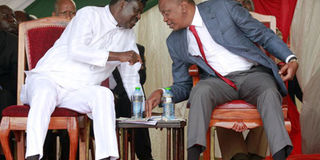National dialogue is still the only way Kenya can deal with negative ethnicity

President Uhuru Kenyatta and Raila Odinga share a light moment at Uzima University in Kisumu on June 26, 2015. PHOTO | TONNY OMONDI | NATION MEDIA GROUP
What you need to know:
- Procurement in the security sector becomes opaque, and sometimes hot air is delivered when an order for bullets has been placed.
- We have established a National Commission on Cohesion and Integration, a toothless bulldog that has lost the ability to bark, let alone bite.
- Kenyans should challenge the political leadership to borrow a leaf from the wisdom of African elders.
When US President Barack Obama visited Kenya on July 24, he found a country that was deeply divided along the lines of negative ethnic politics.
This has been the nature of Kenyan politics since independence 52 years ago.
It was the hope of the common man that he would use this visit to pressure the ever-wrangling political class to view Kenya beyond the tribe.
Indeed, his statements did not disappoint. Addressing the nation at Safaricom Stadium-Kasarani, Nairobi, he warned that when politics is purely based on tribe, it is doomed to tear the country apart. There are enough examples of neighbouring countries that went down this way.
Negative ethnicity is the root cause of our problems. It gives rise to incompetent leadership that lacks the ideological and intellectual conviction to move the country forward.
Negative ethnicity breeds and feeds corruption. In Kenya, you will find civil servants and politicians stealing public resources so that they can purchase political power from their communities.
Whenever they are caught in the act, they mobilise members of their communities to shield them from prosecution. A corrupt politician with a strong ethnic constituency is very likely to escape justice.
Corruption also breeds insecurity and opens doors to terrorism. Those charged with safeguarding our children and assets easily become compromised by warlords and thieves. Border crossings become permeable to moneyed terrorists.
Procurement in the security sector becomes opaque, and sometimes hot air is delivered when an order for bullets has been placed.
The potent mix of ethnicity, corruption and insecurity definitely stifles the economy. A good example is the tourism industry that is down on its knees. Our lovely beaches and national parks no longer attract tourists due to the perception that we are a hotbed of terrorism.
Eastleigh, Nairobi, once a thriving informal business sector, is now dead because of the ethnic profiling of Kenyan Somalis whenever a terrorist attack occurs. Already, we are seeing signs of ethnic mobilisation and militarisation. A divide is being created between Kenyans of Somali origin and the rest of the country.
The narrative is that Kenyan Somalis are sympathetic to terrorists. A similar divide and narrative is being created between Kenyan Muslims and Christians.
I did not expect President Obama to dictate to Kenyans how they must deal with these problems, and I am glad that even though he spoke firmly, he was clear that our prosperity is our sole responsibility.
Our problem is not lack of legislation; we have good laws that seek to promote national unity and cohesion and to counter negative ethnicity.
The Constitution is also very clear on the matter. We have established a National Commission on Cohesion and Integration, a toothless bulldog that has lost the ability to bark, let alone bite.
We have a parliamentary Committee on Cohesion, and a department of Cohesion. But as President Obama said, laws are irrelevant if people lack the will and discipline to see and do things differently.
Despite the Opposition’s perceived inaction, one of the most patriotic proposals they have come up with in recent times was the call for national dialogue on ethnicity and other factors that hold back prosperity. It is unfortunate that the government arrogantly dismissed the idea and seems blinded by a false sense of invincibility.
This kind of intransigence will continue to alienate a majority of Kenyans who pay tax, yet they feel excluded in the country’s development. History has shown that such exclusion breeds resentment that leads to radicalisation and collapse of nations.
It is not too late for Kenya to go back to the call for national dialogue. Kenyans should challenge the political leadership to borrow a leaf from the wisdom of African elders. Whenever they wanted to bring down an ant-hill they would dig out the queen mother termite.
Negative ethnicity is the queen mother that we must dig it out.
Let us hope that in the twilight of his administration, President Obama will use his power and influence to drive our leaders to meaningful national dialogue.
Senator Kajwang is the Homa Bay County Member of the Joint Parliamentary Committee on National Cohesion and Equal Opportunity.




